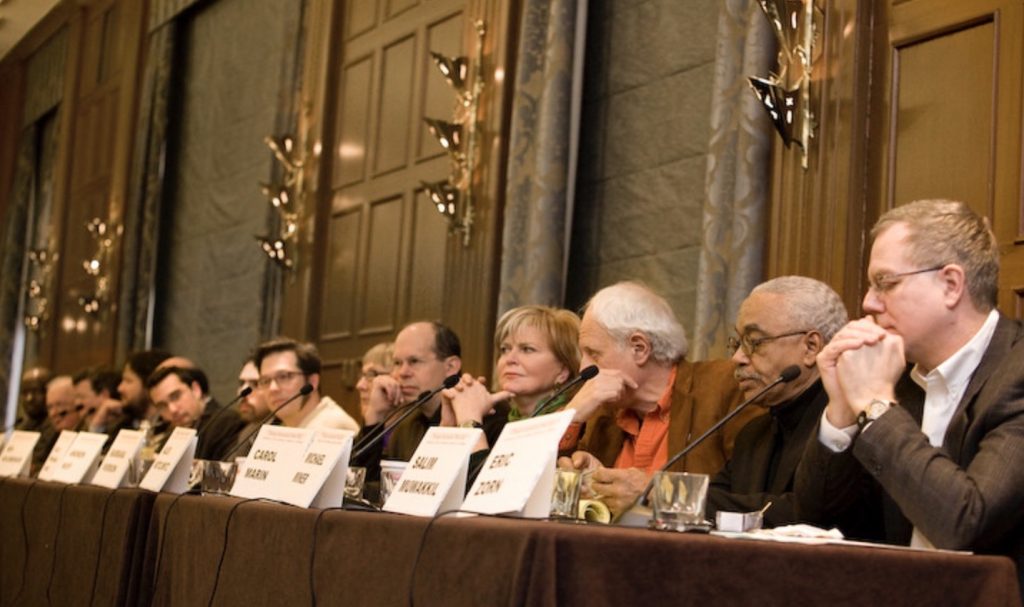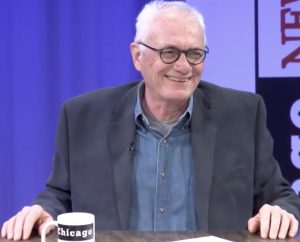On a wintry Sunday afternoon in 2009, Ken Davis and Linda Paul assembled a roomful of media elders and innovators to share their thoughts about the uncertain future of journalism in Chicago.
The first Chicago Journalism Town Hall, as it was called, proved to be a lively exchange of ideas and a unique opportunity to vent some of the hopes and fears of a business facing historic challenges.
"If there was a consensus at the end of the Chicago Journalism Town Hall Sunday, it's that journalism, in some fashion, will always be with us," veteran media critic Michael Miner wrote the following day. "However, something — God knows exactly what — is either slouching or bounding toward Bethlehem to be born."
For Davis and Paul, their abiding interest in the state of local media goes back to the early '80s when the couple worked together at Chicago Public Radio WBEZ 91.5-FM, where Davis was news director, program director and talk show host, and Paul was a producer. They most recently collaborated on "Chicago Newsroom," the weekly roundtable of journalists and newsmakers that aired for nine years on Chicago Access Network TV.
Now they're at it again. Alarmed by the latest existential threats to local journalism, Davis and Paul are organizing another gathering. ("A group of big thinkers and decision-makers in Chicago's media and journalism constellation discuss the challenges they face in 2020 and beyond," they say.)
Billed as Chicago Journalism Town Hall 2020, the event will be February 23 from 1 to 4:30 p.m. in the Walnut Room of the Allegro Hotel, 171 West Randolph Street, Chicago — the same venue as 2009. (Here is the link to the website.)
A limited allotment of free tickets will be available to media professionals, organizations that train local journalists, and students. But even if you can't attend in person, you can see it all live on CAN TV27 and on demand at cantv.org.
Two 90-minute sessions will be moderated by Davis and Heather Cherone, managing editor and City Hall reporter for The Daily Line.
Panelists confirmed so far include:
Tracy Baim, Chicago Reader
Hugo Balta, WTTW
Bettina Chang, City Bureau
Jesus Del Toro, La Raza
Fernando Diaz, Chicago Reporter
Bruce Dold, Chicago Tribune
Steve Edwards, Chicago Public Media
Robert Feder, The Daily Herald
Chris Fusco, Chicago Sun-Times
David Greising, Better Government Association
Karen Hawkins, Chicago Reader
Maudlyne Ihejirika, Chicago Sun-Times, NABJ Chicago
Charlie Johnson, Chicago Tribune
Jamie Kalven, Invisible Institute
Jim Kirk, Crain's Chicago Business
Dorothy Leavell, The Crusader
Carol Marin, NBC 5, WTTW, DePaul University
Charlie Meyerson, Chicago Public Square
Dometi Pongo, MTV
Jackie Serrato, South Side Weekly
Shamus Toomey, Block Club Chicago
Cassie Walker Burke, Chalkbeat
Tiffany Walden, The TriiBE
"Just the last few months have brought us a lot of depressing news," Davis told me Tuesday. "The Tribune. The loss of Hoy. The Defender moving to online only. The shuttering of CLTV. The end of news on WXRT. It all seems like a downward spiral.
"But things are also getting better in a lot of ways," he said, citing a multitude of smaller special-purpose websites that weren't around before.
"While they may not be thriving financially, they’re turning out some first-class, professional-quality journalism. Some of it’s political analysis, some of it's commentary and cultural discussion, and some is enterprise and investigative reporting. In fact, if you take it as a whole, there’s something like a pretty good-sized 'newspaper' being published out there every day. We’ve got a dynamic media landscape here in Chicago right now.
"Whether that independent landscape could eventually compensate for a diminished Tribune is a question that almost certainly will come up at the Town Hall.
"Does a big tree falling in the forest, as some have speculated, open up the canopy for smaller trees to thrive?
"Or is it more like this: The big tree didn’t just fall, it died a slow, painful death because the corporate and social media blood-suckers siphoned off all its water and food, killing not only the big trees, but within short order, every other living thing in the forest. OK, maybe that's overly dramatic. Let’s wait to hear what the panelists have to say. They’ll surely want to kick around whether the Trib can be rescued from a diminished status."
But that's not all. "For legacy media, things have only gotten worse," Davis said. "Google and Facebook are now draining away more and more of the ad revenue from the big newsrooms, making it harder for them to survive.There’s also a massive generation shift away from print, radio and over-the-air TV. So that just complicates things more.
"But this younger audience hasn’t actually stopped wanting news or journalism. It’s just looking for it in other, more comfortable spaces, like Facebook and Twitter feeds, online news sites and podcasts.
"Today some medium-sized legacy operations like the Reader are all-in on not-for-profit. Some have even suggested it for the Tribune going forward. As we know, public radio proved decades ago that audiences are happy to pony up for a product that’s free everywhere else on the dial if they perceive that it has greater value.
"The question still to be answered for online news sites, it seems to me, is whether the consumer can be weaned from the 'news wants to be free' ethos that was born with the early newspaper websites — which blithely put their product up on online for free."
Predicted Davis: "If the first Town Hall is any guide, it’ll be a pretty free-form conversation that takes on a life of its own."
Tuesday's comment of the day: Ryan Ver Berkmoes: Curious strategy, cutting out the very reasons to bother giving the Chicago Tribune any subscription money. I became a huge fan of [David] Haugh when he started at the South Bend Tribune and brought informed, insightful and critical coverage to the paper's Notre Dame coverage. I am one of minority of ND alums who appreciate coverage that's not fawning. Haugh's columns were mandatory reading online no matter where I was in the world every week during football season.



